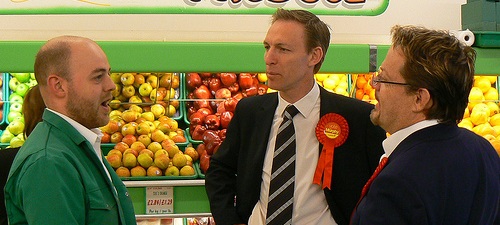 |
| In Castlefields arena, Natalie Bennett addresses protesters from many different movements, who came together in opposition to the Conservative government in Manchester last Autumn. |
Back in the 1980s and 1990s, Liberal and Liberal Democrat leaders Roy Jenkins, Paddy Ashdown and Charles Kennedy followed a course that sought to 'realign the Left' in Britain. Powered by the dominance of Thatcherite conservatism, it sought to change the approach of the left and ultimately lead to co-operation between progressive parties, in opposition to the Conservatives.
First through Liberal-Labour pacts, of which there is an even longer history, next through the breakaway SDP/Liberal Alliance, and then in the form of New Labour-Liberal Democrat talks and cooperation. And Kennedy's 'Real Alternative' campaign banner, even in opposition to a Labour government, reflected the general cohesion of aims on the Left, if not of methods.
That particular movement on the part of the Lib Dems ended with Nick Clegg's leadership. Clegg took the Liberal Democrats back to a policy of equidistance between the two big parties, Labour and the Conservatives.
However, the fall of the coalition and succession of a Conservative to a majority government seems to have triggered a new phase of realignment. The resignations of Clegg and Miliband led to the election of new party leaders, seen to be of very different stripes from their predecessors.
Tim Farron, the new Lib Dem leader, is a campaigning Northern MP and former Party President who stood aloof from, and in polite opposition to, the coalition. So far his efforts have been concentrated on focussing the Lib Dem fightback on the party's roots - in campaigning locally for community issues and nationally on matters of conscience.
Jeremy Corbyn's election as Labour leader seemed to send shockwaves through British politics. Portrayed by the media as a move back to some Michael Foot and Tony Benn, 80s-esque, hard Left position, Corbyn has faced disquiet and malcontent within the Parliamentary party since taking over with a landslide of party members' votes.
After the last five years, the seemingly inevitable alignment of the Liberal Democrats and Labour was shattered. It would be understandable to think finding new common ground would be difficult or impossible between the party Clegg had taken to the Centre, even Centre-Right, and the party Corbyn has been accused of taking to the hard Left.
Yet a new realignment of the Left is under way and the policies that will define the shift are already emerging in the policy debates of both parties.
Both the Liberal Democrats and Labour now seem to be on the same page, finally, when it comes to proportional representation. Both Shadow Chancellor John McDonnell, from Labour's Left, and Chuka Umunna, from Labour's Right, have expressed support for PR. And both parties are engaged in consultations over their future approach to policy, including the welfare system - debates in which the idea of a universal basic income is playing a prominent role.
Ahead of the EU referendum, Farron has even called for a progressive political alliance on Europe - making internationalism again a core value across progressive parties. That matches, in a limited way, the arguments that Caroline Lucas, the Green MP, has been making since the last election that progressive parties need to start working together.
As for the Green Party, in true Green fashion Natalie Bennett is following Caroline Lucas' lead in standing down as party leader once her term is up later this year. So who will lead the Greens through this new realignment, and how they will handle it on into the 2020 general election, is unknown.
But the challenge ahead of the three leaders of Britain's main progressive parties is clear: to stop the Conservatives winning their way to back-to-back governments. Aligning in support of some core common policies is a start.
The next step is to commit to the kind of cooperation on various campaigns and causes that can foster the good will between parties. That mutual respect will be needed to build a real electoral alliance, that stands together behind a limited set of core ideals in opposition to conservatism.


